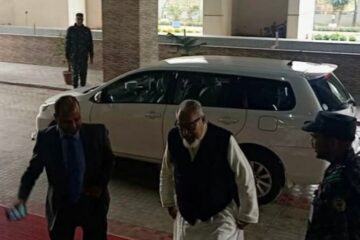Mujibur Rahman Monju, president of the Amar Bangladesh Party (AB Party), is a former student of Chittagong University who was involved in Islami Chhatra Shibir politics during his student life. He served as the organization’s central president and general secretary. Later, he joined Jamaat politics. He resigned from Jamaat in 2019 and formed the AB Party.
Dhaka Tribune staff reporter Tanvir Hasan recently spoke to Mujibur Rahman Monju about various ongoing issues in the country.
Dhaka Tribune: Could the Consensus Commission’s proposals regarding the implementation of the July Charter create any complications in the future?
Mujibur Rahman Monju: If the parties that signed the charter, who may come to power in the future and represent the people in parliament, break the pledge made in the July Charter, then complications will definitely arise. Moreover, if a representative or an independent candidate from a party that did not sign the charter is elected to parliament, they may also have a negative attitude towards implementing its pledges. That is why it is very important to get the people’s consent to implement the charter through a referendum. This will strengthen the legal basis and reduce the chances of complications.
The interim government has announced that it will hold parliamentary elections in the first half of February. How feasible is it to hold fair elections in the current law and order situation? And do you think there are concerns about holding the elections on time?
Monju: We do not see any crisis in organizing the elections. However, the violent attitude and intolerant policies observed among some political parties raise serious doubts about the fairness and acceptability of the polls. If the old mindset and behaviour of powerful political parties do not change, it may become impossible for the law enforcement agencies to conduct fair elections. In the emerging situation, we fear that the elections may be postponed, cancelled, or even lead to the resignation of the interim government.
Several political parties are demanding a ban on the Jatiya Party. What is the AB Party’s position on this issue?
Monju: The Jatiya Party is the main ally of the fascist regime. They have had the opportunity many times to join the democratic movement by correcting their mistakes. But instead of doing so, they have always followed opportunistic policies. They are not only enemies of the rights of the country’s large population deprived of votes, they have also been dishonest with the Awami League. Seeing the situation as hopeless, they tried to prove themselves as opponents of the fascists by joining hands with us at the end of the mass uprising, but they did not resign from the illegal puppet parliament. If Hasina had survived, they would have changed their minds by now. They would have called the power of the mass uprising ‘anarchists’ while sitting in the illegal parliament. Therefore, the Jatiya Party should now suffer the consequences of this deception, opportunism, deceit, and dishonesty. We are in favour of taking necessary and effective measures, including legal sanctions, against the Jatiya Party and its leadership.
What are your party’s thoughts on alliances in the next election?
Monju: The party has not yet decided whether the AB Party will join any electoral alliance. We are preparing to participate in the elections alone. If there is a proposal to join any alliance, we will discuss it in the party forum and decide. However, we are trying to form an alliance with all the parties that are working on the political proposals of the new settlement rather than the old political parties.
You were the president of Chhatra Shibir. Recently, Chhatra Shibir won a landslide victory in the student union elections of four universities in the country. Can the results of these student union elections have any impact on the next national elections?
Monju: I was the president of Shibir 22 years ago. I am happy that Chhatra Shibir won very well in the student parliament elections of four universities. I consider this an achievement beyond normal circumstances. If democracy were practiced in educational institutions, Chhatra Shibir would have always done well, and the steps taken by Shibir to come out of its isolated shell and present itself in an inclusive form would have been effective much earlier.
I believe that these steps and achievements of Shibir will definitely have an impact on national politics and will also motivate Jamaat to take reform steps.



